- Home
- Robert Goddard
Painting The Darkness - Retail
Painting The Darkness - Retail Read online
About the Book
1882. When the creak of the garden gate one autumn afternoon sounds the arrival of an unexpected stranger, William Trenchard is puzzled, but not alarmed. He cannot possibly know the destruction this visitor will wreak on all he holds dear.
The stranger is James Norton, who claims to be the man William’s wife Constance was once engaged to, and who was reported to have committed suicide eleven years ago. Trenchard fears the loss of his wife’s affections, but he is forced to plumb the depths of his own despair before the dark secrets of the Davenall family can finally – shockingly – be revealed …
Contents
Cover
About the Book
Title Page
Dedication
The Davenall Family
Chapter One
Chapter Two
Chapter Three
Chapter Four
Chapter Five
Chapter Six
Chapter Seven
Chapter Eight
Chapter Nine
Chapter Ten
Chapter Eleven
Chapter Twelve
Chapter Thirteen
Chapter Fourteen
Chapter Fifteen
Chapter Sixteen
Chapter Seventeen
Chapter Eighteen
Chapter Nineteen
Chapter Twenty
Epilogue
Acknowledgements
About the Author
Also by Robert Goddard
Copyright
To my mother
THE DAVENALL FAMILY (as at 1st October 1882)
Chapter One
I
IT WAS TEN years since William Trenchard had first met Constance Sumner and helped her begin to forget the tragedy of her fiancé’s suicide. Absorbed at the time in a grief dangerously close to martyrdom, she had at first supposed that no man could ever mean nearly as much to her as the forever absent James Davenall. But in that, as in much else, she was wrong.
It was seven years since the newly married Trenchards had moved into The Limes, a St John’s Wood town house acquired for them by William’s father, co-founder of the Trenchard & Leavis retailing chain. They had seemed, in doing so, to absorb into their lives the restraint of the pollarded trees lining Avenue Road and the rectitude implicitly bricked and wainscoted within their stolid household. They must each have thought then that the uncertainties of youth were gone for good and all. But in that, as in much else, they were wrong.
It was four years since the birth of his daughter, Patience, had seemed to confirm that William’s greater commitment of late to the business of Trenchard & Leavis was no transitory phenomenon. His father began then to believe that, even if William could never rival the energy and acumen of his brother Ernest, he was at least safe from making of his life anything that was less than respectable. But in that, as in much else, he was wrong.
It was just over a year since Constance, making her way one afternoon towards Regent’s Park, where she intended to surprise Patience and her nanny during their customary sojourn by the boating-lake, had seemed to recognize amongst a smattering of spectators bustling away from Lord’s cricket ground a sombre middle-aged man whose suit was too heavy for the warmth of the day. Later, entering the park by Hanover Gate, she had remembered who he was: Richard Davenall, an older member of the family she had so nearly married into. She had thought then, and smiled to herself as she did so, how odd it was that she would never know any more of the affairs of the Davenall family, in which she had once been so closely involved. But in that, as in much else, she was wrong.
It was only two days since William Trenchard, proceeding in the opposite direction across the park at the dusty mist-tinged close of an Indian summer’s day, had turned at the sound of laughter from a tree-hung bank that ran down to the lake, and had seen, reclining on the sun-stippled grass, a startlingly beautiful young woman in a pink dress, taking amused issue with her male admirer, who was crouched at her feet, waving his bowler hat in demonstration of a trivial point. The gesture had struck Trenchard as ludicrous, and he had smiled, then grown suddenly sombre. From all the daring beauty and unexpected drama he had fleetingly perceived in the girl’s face, he felt excluded by age and dress and station. It was, of course, merely the sensation of a moment. He was not dissatisfied with his life, did not crave change or any disruption to the pattern of his existence. He was thirty-four years old; complacent, yes, but unworthy never. He had made his way home reflecting, a touch wearily, that the pleasures of his particular world possessed at least the warmth of utter security. But in that, as in much else, he was wrong.
It was only an hour since William Trenchard, tiring of pushing Patience on the swing old Burrows had rigged up beneath the stoutest of the apple trees, had packed his daughter off to bother his wife in the conservatory while he took a quiet Sunday-afternoon pipe, sat on the croquet bench and admired, as he often did, the great knotted tangles of wistaria that swathed the southern gable of the house. It was the first day of October 1882, but there seemed no other beginnings to detect in the mild autumnal air, there or elsewhere, in the whole, braced, eventless inertia of a secure unchanging Empire. Not that William Trenchard bothered overmuch with philosophy, or even patriotism beyond the level of a decent instinct. Indeed, he might have been judged if viewed from a little way off – through the open side-gate, perhaps – to embody most of what was worst and best in the limited imaginings of the average upper-middle-class Victorian gentleman. But in that, as in much else, he would have been wrongly judged. For only an hour later William Trenchard’s life, and that of every occupant of The Limes, St John’s Wood, had changed utterly – and for ever. An hour was all it took for ten years to overtake them.
II
Burrows must have left the side-gate open. I remember noticing it from where I was seated on the croquet bench and thinking how careless he was growing. Not that I was surprised, in view of his age, or even irritated, thanks to the soothing effects of good pipe tobacco and a splash of evening sunshine, but it drew my attention by the view it afforded of the drive in front of the house curving towards the road. Any slight movement in the street – where generally there was none – would have tended to catch my eye, and that – as no more than a flicker on the very edge of my vision – is how I first saw him.
It was six weeks later, in circumstances he could never have foreseen, that William Trenchard commenced a written account of the events which were to be set in motion that seemingly innocent Sunday afternoon in St John’s Wood. His reason for writing such an account was as compelling as its effect is revealing, for it removes at a stroke the need to speculate about why he reacted as he did to the circumstances which overtook him. His every action, his every statement, stands justified or condemned – in his own words.
A tall slim man, elegantly dressed in dark top-hat, frock-coat and fawn trousers, carrying a silver-topped cane, stopped as he passed the entrance to the house, with just the barest scrape of leather sole on paving stone, drew up like one who had just remembered a commitment of no great importance. The sun caught the silver on his cane as he tossed it from his right hand to his left, twitched back his coat with his free hand and reached into his waistcoat pocket. He drew out a scrap of paper and looked at it, then replaced it and turned slowly in my direction.
I have struggled to recollect my immediate impression of him, laboured to erase all that subsequently happened so that I can see him clearly for what he was then: a man of about my own age, darkly handsome, bearded, though not extravagantly so, perfectly attired, tie-pin and watch-chain glinting, the thumb of one kid-gloved hand resting in his waistcoat pocket whilst the other swung the Malacca
cane in slow silent arcs beside him. I was sure I did not know him, even as a local resident: he looked as if St James’s were more his mark than St John’s Wood. There was something scarcely suburban about the tilt of his hat, something vaguely disturbing about the private smile hovering on his mouth.
He began to walk slowly up the drive, rather too slowly merely for decorum’s sake, as if deliberately delaying the moment of his arrival. My attention, at first so idly focused, was now clamped upon him. As he passed the side-gate, he saw me watching him and, as he looked towards me, I felt suddenly cold.
He stepped through the brick-arched gateway, stooping slightly to clear the crown of his hat, and stood there, ten yards from me, neither advancing nor retreating, neither speaking nor motioning; daring me, as it were, to break the silence.
I rose from the bench and moved towards him. ‘Good afternoon,’ I said. ‘Can I help you?’
‘I am so sorry to intrude,’ he said as I drew closer. ‘Do I have the pleasure of addressing Mr William Trenchard?’ The voice was rich and low-pitched, cultured and correct, a little too correct one might have said, a little too mannered for comfort.
‘I am William Trenchard, yes. As you see’ – I gestured at my shabby attire – ‘we were not expecting visitors.’
‘Forgive me. The circumstances of my visit are somewhat … unusual. They must excuse this … unannounced arrival.’ He extended his hand. ‘The name I go under is Norton. James Norton.’
His grip was firm and unwavering, mine anything but. ‘Have we met before, Mr Norton?’
‘We have not.’
‘Is it, then, a matter of business? If so, Trenchard and Leavis are—’
‘The matter is entirely personal … and profoundly delicate. I hardly know where to begin.’
I bridled. This proclaimed uncertainty clashed utterly with what I had so far seen of him. It smacked of a prepared approach. ‘I think, Mr Norton, it would be as well if you stated your business plainly.’
He timed a pause perfectly to allow me to begin to believe he could be swiftly disposed of, then resumed as courteously as before. ‘Of course. You are quite right. I said that we had not met before, and that is true. It is with your wife that I am acquainted.’
What man, even one as contentedly married as me, could have heard his wife spoken of in this way by a stranger without some frisson of an unworthy suspicion? ‘What is your meaning, sir? I am acquainted with all my wife’s friends, and you are not among them.’
He smiled. ‘Perhaps I should have made myself clearer. Your wife and I knew each other many years ago, before you married her. In point of fact, we were at one time engaged.’
I felt then that I knew he was lying; felt relieved, indeed, that the lie was as obvious as this. ‘You are mistaken, Mr Norton. Perhaps you have called at the wrong house.’
He continued undaunted. ‘Your wife’s maiden name was Sumner. We were engaged to be married eleven years ago. I have come here today—’
‘You have come here today either under a grotesque misapprehension or under false pretences.’ He could see now that I was angry, but there was no change in his expression. Perhaps he sensed that my anger was directed at myself as much as at him. Somewhere, beyond the reach of logic, I had begun to question Constance’s account of her life before we met. That, as much as the softly spoken Mr Norton, is what I was trying to talk down. ‘My wife was engaged to another man eleven years ago, it’s true. But that man is dead.’
‘No.’ He shook his head slowly, as if he were truly sorry to disillusion me. ‘I’m afraid not, Mr Trenchard. I am that man. Not James Norton, but James Davenall. And, as you can see, far from dead.’
I was about to respond – with a request for him to leave in short order – when I saw Constance coming towards us from the house. She must have seen us from the conservatory and wondered who our visitor was. Mercifully, Patience was not with her. As it was, with his back turned towards her, Norton could not have known she was there, but may have guessed it from the look on my face. At all events, he continued as if playing to a gallery of more than one.
‘I have not come here to antagonize you, nor to shock Constance, merely to seek her support in establishing my identity. There are, you see, those who wish to deny that I am James Davenall.’
These last words Constance must have heard. She pulled up sharply and frowned towards me in anxious puzzlement. A moment before, she had been the placidly beautiful woman I had married. Now, at the audible mention of that name, there crossed her face that cast of grief I had not seen since the earliest days of our acquaintance.
‘What does this mean?’ she said.
I should have answered, should have prepared her, should have armed her against him. But I hesitated, and in the moment of my hesitation Norton turned and looked directly at her. I could not see his face, but I could see Constance’s and could read there, as he must have done, the uncertainty that proclaimed louder than any words: it might be true.
‘It’s no ghost you see, Connie,’ he said. ‘It’s me, true enough. I’m so sorry to have deceived you.’
She moved closer, eyeing him with rigid scrutiny, erasing from her features that initial eloquent moment of doubt. ‘There is no need to apologize,’ she said levelly. ‘You have not deceived me. There has been a mistake. You are not James Davenall.’
He replied softly, with nerveless conviction. ‘You know that I am.’
‘James Davenall took his own life eleven years ago.’
‘Until a moment ago, you could believe that. Now you know it isn’t true.’
I decided it was time to intervene. I stepped forward and took Constance’s arm. There we stood, together against him, we on the grass, he on the gravel, shadows lengthening about us. ‘What do you want of us, Mr Norton?’
‘I had hoped that Connie – that your wife – would be prepared to admit that she knows me. I have been turned away by my family and—’
‘You have been to them?’ said Constance.
‘Yes. I have been to them – and they have set their faces against me.’ He glanced at his feet, as if pained by the thought, then back at us or, rather, at Constance, for I had become a mere observer of their exchanges. ‘Will you join them in their pretence – or listen to my explanation? There is much that I have to tell you.’
‘Mr Norton,’ she replied, ‘I do not know what purpose you think will be served by this macabre fiction, but you may take it that I wish to hear no more of it.’
‘If only it were as simple as that,’ he said. ‘I tried to pretend myself that James Davenall no longer existed – and I didn’t succeed. Now others are making the same mistake.’
‘Excuse me, Mr Norton. There is nothing more to be said.’ She turned and walked back towards the house. As he watched her go, I scanned his face for the deceit or devilry I expected to find there, but found only a questing sadness. Absurdly, it made me feel almost callous in saying what I said next.
‘Will you leave now? Or must I summon a constable?’
He seemed to ignore the question. ‘I’m staying in the hotel at Paddington station. When Connie’s had a chance to think about it …’
‘We will not be thinking about you, Mr Norton. We will be doing our best to pretend you never came here, which is what I advise you to do as well. You have heard our last word on the matter.’
‘I think not.’
Before I could say anything else, he turned and walked smartly back through the side-gate and away down the drive. As soon as he was out of sight, I headed for the house.
I found Constance in the drawing-room. She was standing before the wood-framed mirror that topped the mantelpiece, around which was arranged a selection of family photographs: her parents, mine, her late brother, Patience playing with a bauble at the age of three months. And our wedding: May Day 1875. An assortment of Trenchards and Sumners striking poses in the palm-fringed ballroom of a Wiltshire hotel. A perfect marriage of church and trade and the ghost at the feast st
ill seven years in the future.
I put my arm round her shoulders. ‘He’s gone now. I’m sorry if he upset you.’
She shuddered. ‘It’s not that.’
‘There’s no possibility, is there, that he could be who he says he is? I know Davenall was supposed to have drowned, but …’
Her eyes met mine in the mirror. ‘You saw it, too, then?’
‘I saw nothing. It’s for you to say. You knew him.’
She turned and looked at me directly. ‘James died. We all know that. There was … a resemblance. But not enough. And yet …’
‘You can’t be absolutely certain?’
‘Perhaps I should have listened to him.’
‘It would have nailed the lie soon enough if you had. As it is, he can claim we didn’t give him a fair chance to state his case.’
She fell silent, leaning against me and rocking slightly as she thought. I heard the clock ticking with exaggerated solemnity on the mantelpiece beside us. From above came the patter of Patience’s feet in the nursery and a splash of water: it was bath-time for our daughter.
‘He’s just a fraudster, Connie. There’s a baronetcy at stake – and an inheritance, too. Missing heirs are meat and drink to these fellows. Remember the Tichborne nonsense?’
She looked up at me as if she had not heard a word. ‘I need to be sure. It is … just possible. We must speak to his family.’
‘Very well,’ I said. ‘I’ll see them – tonight if I can. That should settle it.’
III
A little after six o’clock that evening, William Trenchard picked up a cab in the Wellington Road and bade it take him to Bladeney House, Chester Square, the London residence of Sir Hugo Davenall. He sat well back in the cab and smoked a pipe to calm his nerves while the driver made good time through the sabbath-emptied streets.
Quite why he was so nervous he was not sure. Socially, he and the Davenalls were clearly worlds apart. Had Constance been their daughter, marriage to the son of a shopkeeper, which, making all due allowances for old Lionel Trenchard’s success, William undoubtedly was, would have been out of the question. He had, as a matter of fact, never met any of them. His knowledge of them was entirely confined to what Constance had told him. Perhaps this, after all, was the root of his present insecurity. An unannounced visit on a Sunday evening was certain to be forgiven in view of the compelling circumstances, but the suddenly shifting sands of what had always seemed to him so firmly, if tragically, founded – his wife’s past – were quite another matter. As the cab turned into Baker Street and slowed reverentially at sight of a Salvation Army parade in the Marylebone Road, Trenchard began to review in his mind what little he actually knew.

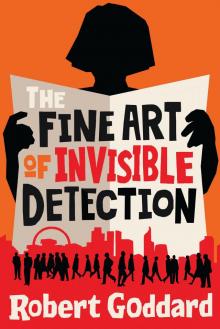 The Fine Art of Invisible Detection
The Fine Art of Invisible Detection One False Move
One False Move Panic Room
Panic Room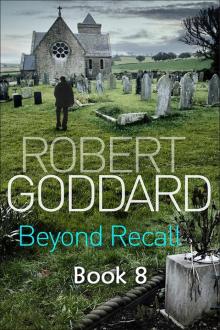 Beyond Recall
Beyond Recall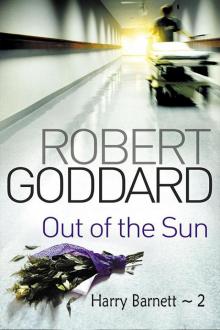 Out of the Sun
Out of the Sun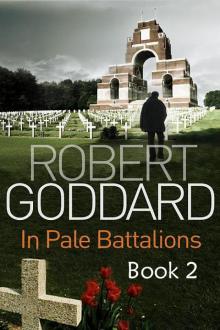 In Pale Battalions - Retail
In Pale Battalions - Retail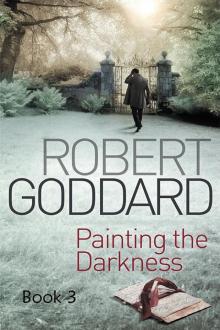 Painting The Darkness - Retail
Painting The Darkness - Retail The Corners of the Globe
The Corners of the Globe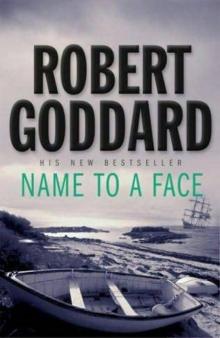 Name To a Face
Name To a Face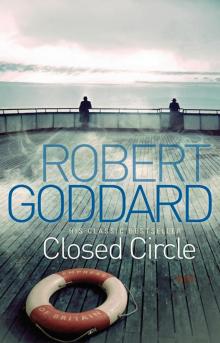 Closed Circle
Closed Circle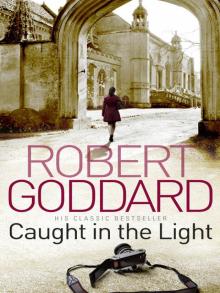 Caught In the Light
Caught In the Light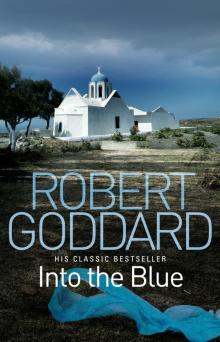 Into the Blue
Into the Blue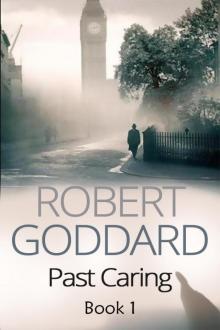 Past Caring - Retail
Past Caring - Retail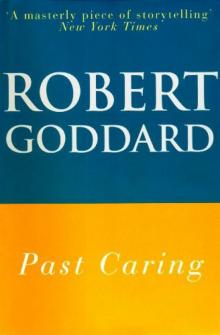 Past Caring
Past Caring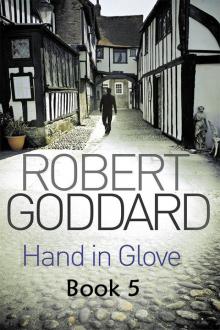 Hand In Glove - Retail
Hand In Glove - Retail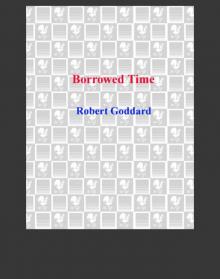 Borrowed Time
Borrowed Time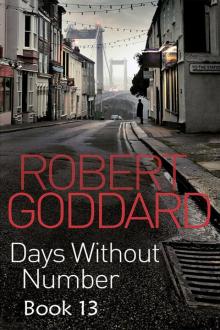 Days Without Number
Days Without Number James Maxted 03 The Ends of the Earth
James Maxted 03 The Ends of the Earth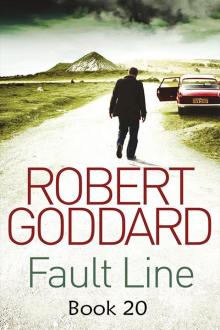 Fault Line - Retail
Fault Line - Retail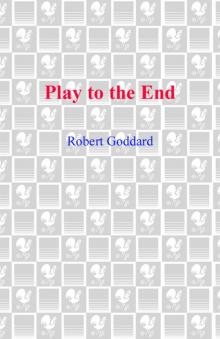 Play to the End
Play to the End Sea Change
Sea Change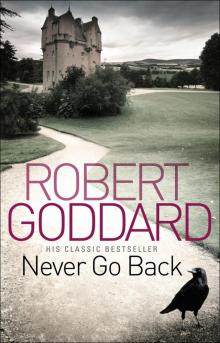 Never Go Back
Never Go Back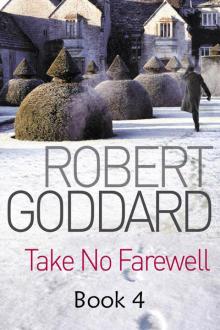 Take No Farewell - Retail
Take No Farewell - Retail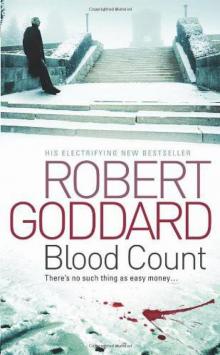 Blood Count
Blood Count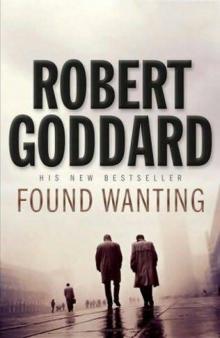 Found Wanting
Found Wanting Sight Unseen
Sight Unseen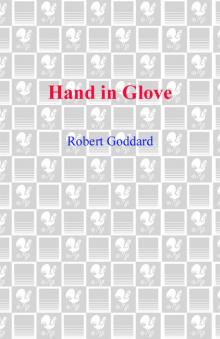 Hand in Glove
Hand in Glove The Ways of the World
The Ways of the World